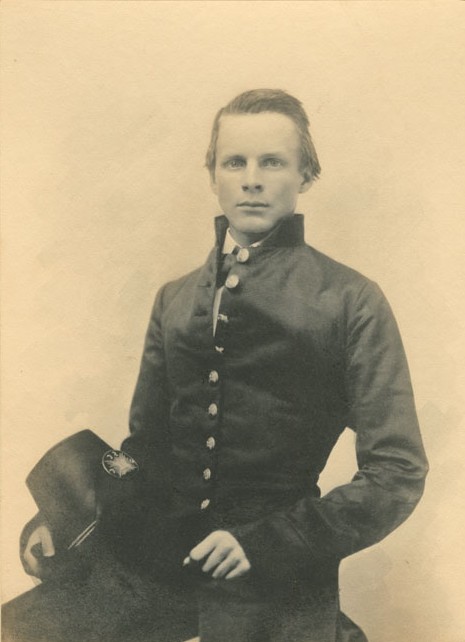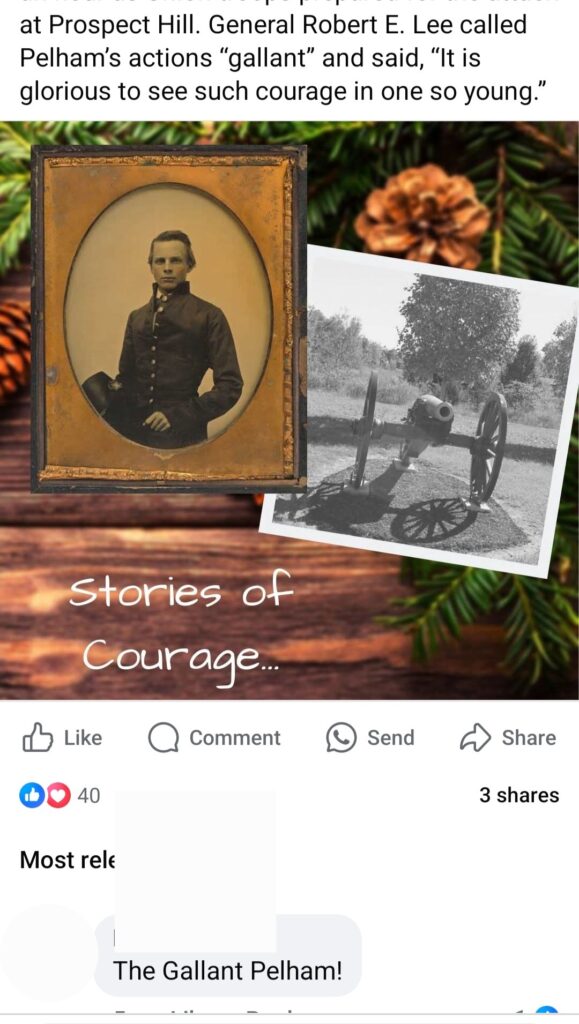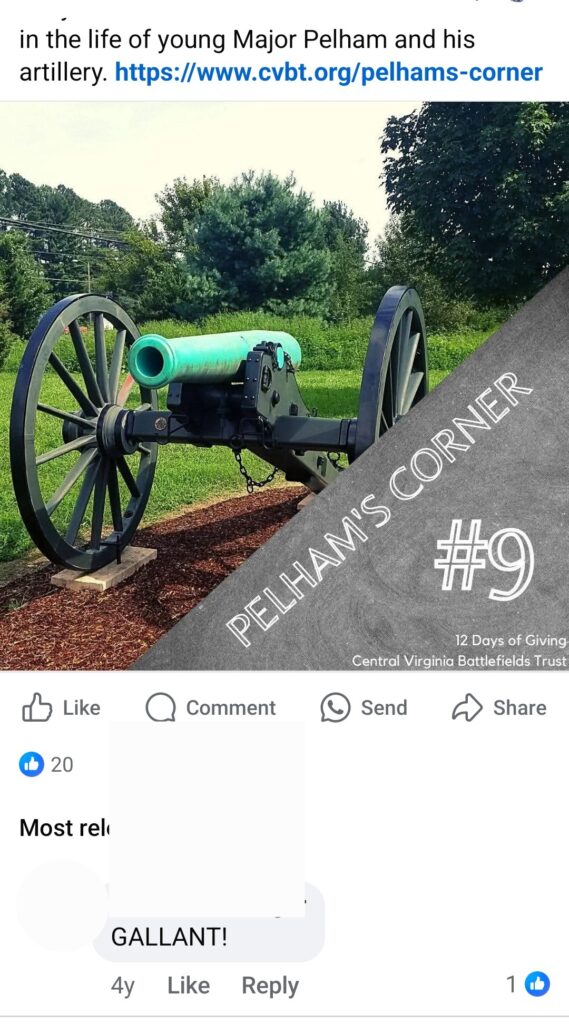John Pelham & The Definitions of “Gallant”
It is a truth universally acknowledged (in the Civil War history world) that a single man by the name of John Pelham must be called “gallant.” And so he is for 160 years of memory and historiography…and not without good reason. Where did the adjective come from and what did it mean in 19th-century definition?
“Gallant Pelham.” A number of years ago when I worked at the Central Virginia Battlefield Trust, I had some fun posting about Confederate artillerist John Pelham and the land that CVBT has preserved connected to his battlefield exploit during the battle of Fredericksburg in December 1862. It was a lot of fun to read the comments. Here are a couple of examples, and no disrespect meant to the commenters!
My conclusion? It’s impossible to write or post about this young officer from Alabama without acknowledging that adjective that has become a nickname. It’s engraved on monuments, etched in memorial walls, titled quite a few books, and is just the thing that everyone adds to a discussion about Pelham. “Ah, The Gallant,” comes the reply with a certain expression of wistfulness.
Appropriately, “Gallant” and its attachment to the commander of the Stuart Horse Artillery is traced to the battle of Fredericksburg, and it was given during the man’s lifetime. It seems likely that the adjective could have been associated with other 1862 fights that Pelham had engaged in; by definition, it would apply in the battlefield courage sense of the word. However, at Fredericksburg, the word comes from the mouth of Gen. Robert E. Lee, commander of the Army of Northern Virginia.

It’s the morning of December 13, 1862. Union infantry waits in formation in front of the Confederate line at Prospect Hill—the Confederate’s right flank. Nothing seems to be happening. Major John Pelham approaches cavalry commander Gen. J.E.B. Stuart and asks for permission to take a cannon forward, position on the flank of those waiting Union soldiers, and open fire. Stuart agrees.
It becomes the stuff of legends. Pelham and a gun crew advance nearly a mile ahead of the main Confederate line and open enfilading fire on the Union infantry. Confusion and surprise. Then, Pelham stays—ordering and assisting the gun crew to move their cannon between firing and making it difficult for Union gunners to accurately find their position. The lone gun draws the attention of two armies and the fire from at least five Union batteries. As the unequal duel intensifies, Stuart worries for the safety of his young commander and tries to send another cannon to his support, then multiple messengers urging Pelham to withdraw. Pelham stays.
From the high ground of the Confederate line, Gen. Robert observes the artillery fight, calls Pelham’s action “gallant,” and reportedly remarks: “It is glorious to see courage in one so young!” By the time Pelham runs out of ammunition (and the Iron Brigade is advancing on his exposed position), he has a new designation: “The Gallant.” Lee spoke it, newspapers—southern, northern, and eventually internationally—will pick up the nickname, and it will be his forever.
What did “gallant” mean in mid-19th century American context? Turning to the 1828 Noah Webster dictionary can sometimes be helpful in cases like this. While this edition of the dictionary certainly has words or definitions that were outdated by the 1860s and new words or meanings in use, it came be useful for establishing a baseline of a word’s meaning.
Gallant (adjective)
- Gay; well dressed; showy; splendid; magnificent. [This sense is obsolete in 1828.]
- Brave; high-spirited; courageous; heroic; magnanimous; as a gallant youth; a gallant officer.
- Fine; noble.
- Courtly; civil; polite and attentive to ladies; courteous.
Gallant (noun)
A gay, sprightly man; a courtly or fashionable man.
- A man who is polite and attentive to ladies; one who attends upon ladies at parties, or to places of amusement.
- A wooer; a lover; a suitor.
- In an ill sense, one who caresses a woman for lewd purposes.
Gallant (verb)
To attend or wait on, as a lady.
- To handle with grace or in a modish manner.[i]
Let’s start with the adjective form, and set aside the first definition since it was mostly out of use already in the 1820s. The second definition is the most common meaning of “gallant” as it is used in Civil War officers’ language: “brave; high-spirited; courageous; heroic; magnanimous.” Pelham’s observed actions at Fredericksburg certainly qualify for the term!
However, the term “Gallant” was not an adjective used exclusively to describe John Pelham. Many other officers—both Confederate and Union—used (or over-used the term) in their writings. For example, in Volume 21 of the Official Records of the War of the Rebellion—the volume that includes the battle of Fredericksburg—the word “gallant” appears 125 times, according to a quick keyword search. Reading reports in the Official Records for many battles reveals the word “gallant” as a frequent compliment for bravery and courage. And, yes, there on page 547 as part of Lee’s reports appears this line: “As soon as the advance of the enemy was discovered through the fog, General Stuart, with his accustomed promptness, moved up a section of his horse artillery, which opened with effect upon his flank and drew upon the gallant Pelham a heavy fire, which he sustained unflinchingly for two hours.”[ii] Across other reports from the war, Lee called other officers and their actions “gallant.”
It was a word in Lee’s military vocabulary, but it really stuck to Maj. John Pelham. Drawing from Lee’s report, the account of “gallant Pelham” and the cannon at Fredericksburg was reprinted in newspapers, priming the press for the dark news in the spring of 1863. Pelham died from a mortal wound received on March 17, 1863, during the battle of Kelly’s Ford, and newspapers titled their death announcements “The Gallant Pelham.”
Turning to the noun and verb definition of “gallant” is another aspect of the word that goes beyond battlefields. This definition brings in a social aspect: “A gay, sprightly man; a courtly or fashionable man…who attends upon ladies at parties.” (Note: “gay” as used in the 1828 Webster Diction refers to “Merry; airy; jovial; sportive; frolicksome.”[iii])
Again, the definition can apply to John Pelham. Through his letters, others’ descriptions during his lifetime, and later memories of those who knew him, Pelham had manners and in relaxed social settings was known for liking jokes and amusement. There is a surviving letter from his West Point years before the Civil War that almost perfectly fits this definition, but it is difficult to tell how serious or teasing he was when he wrote to his brother: “Remember the best weapon for conquering women is flattery. Don’t talk to them about History or Grammar, nor the Philosophy of Socrates or Zeno, but talk to them about the Moon, spoons, the Starry Heavens, and moonlight walks. . . .”[iv] During the Civil War years, Pelham certainly interacted with women, but available primary sources cast doubt that he was “the grandest flirt that ever lived” and suggest that his social gallantry may have been more subdued and tingled with a shyness among strangers. As time passed after Pelham’s death and he became part of the Lost Cause collection of officers, the complimentary adjective “gallant” became a confusing blend of battlefield legend with an undercurrent of flirtatious or sexual meaning attached to the bachelor officer.
For a long time “gallant” was one of my least favorite words, and I know some of my friends heard a tirade or two about it. But here’s why. Pelham was gallant, and I’m not here to try to take away the compliment! However, I think it’s a disservice to Pelham and to ourselves if our response to his name is just to screechingly, reverently, or jokingly say “Ah, The Gallant Pelham.” There is a lot to the story of his short life. Even a lot more than the battle of Fredericksburg and Lee’s simple commendation. I want to make sure Pelham’s life is remembered and studied for more than a word…and more than the ideas wrapped up in that word. Pelham was gallant…but he was also so much more.
Read more in one of the newest books in the Emerging Civil War Series—Glorious Courage: John Pelham in the Civil War by Sarah Kay Bierle (May 2025).
Notes:
[i] Noah Webster, “Gallant”, 1828 Webster Dictionary. Accessed online at https://webstersdictionary1828.com/Dictionary/gallant
[ii] Official Records, Volume 21, Page 547.
[iii] Noah Webster, “Gay,” 1828 Webster Dictionary. Accessed online at https://webstersdictionary1828.com/Dictionary/gay
[iv] Jacksonville Public Library, Pelham Collection, Folder 3, September 1858 letter to Charles Pelham, published in newspaper.


Thoughtful, engaging, and well done article.
Nicely done, and your post inspired me to order your book.
Hi Sahra,
Nice post. I am currently reading your book and enjoying it very much.
Hi Sarah,
Great Post. I am currently reading your Pelham book and enjoying it greatly